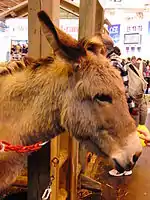Provence Donkey
The Provence Donkey, French: Âne de Provence, is a breed of domestic donkey from Provence, in south-eastern France. It is now distributed through much of central and south-east France, with the highest concentration in Provence and the Rhône-Alpes region.[6] For hundreds of years the Provence donkey was used by transhumant shepherds of the area as a pack animal in the seasonal movement of flocks of sheep between their summer pastures on the high Alps of Haute-Provence and the Dauphiné and their winter grounds in Basse-Provence.[7]
 | |
| Conservation status | |
|---|---|
| Other names | |
| Country of origin | France |
| Distribution | |
| Standard | Ministère de l'Agriculture |
| Traits | |
| Height | |
| Coat | dove-grey with pink lights[5] |
| |
History
The earliest records of the use of donkeys by shepherds in Provence are from the fifteenth century. During the seasonal transhumance between the low ground where the sheep over-wintered and the high alpine pastures where they spent the summer months, donkeys were used as pack animals. They carried, on specially adapted pack-saddles, the equipment and supplies needed by the shepherds along the journey.[5][7] The area of origin of the breed appears to coincide exactly with the area, consisting of Provence and parts of Savoie and the Ardèche, where transhumant sheep-farming was traditional.[7]
Following the mechanisation of transport in the twentieth century, first by rail and then by road, the breed declined at an alarming rate. At the end of the 19th century, a census in the départements of Provence recorded 13,000 head; in 1956 the number had fallen to around 2000, and by 1993 no more than 330 could be identified.[6]
A breeders' association, the Association de l'Âne de Provence, was formed in December 1992,[8] and worked with the Haras National, the national stud, of Uzès, in Languedoc-Roussillon, to achieve recognition of the breed. A stud-book was opened in December 1995,[9] and in November 2002 the Provence donkey received the official recognition of the Ministère de l'agriculture, de l'alimentation, de la pêche et des affaires rurales, the French ministry of agriculture.[10] The current population is estimated at 1500.[6]
Description
At three years old, Provençal jacks stand 1.20–1.35 metres (47–53 in) at the withers, and jennies 1.17–1.30 m (46–51 in).[4]
The coat is dove grey, varying from pale to dark, with pinkish lights. The muzzle and surround of the eyes are pale; the forehead and ears usually have a russet tint. There is a well-marked darker dorsal stripe and shoulder-stripe; zebra-striping of the legs may be present. The limbs are solid and the hooves relatively large.[5]
Use
Provençal donkeys are still used in transhumance by some shepherds.[6] The Provence Donkey is suitable as a pack animal, for light driving and for riding. Its character and sure-footedness even on broken ground make it suitable for trekking. It may be used in vegetation management, for brush clearance to reduce fire risk.[7]

 Colour variation
Colour variation Dorsal stripe and cross
Dorsal stripe and cross
References
- Barbara Rischkowsky, D. Pilling (eds.) (2007). List of breeds documented in the Global Databank for Animal Genetic Resources, annex to The State of the World's Animal Genetic Resources for Food and Agriculture. Rome: Food and Agriculture Organization of the United Nations. ISBN 9789251057629. Accessed July 2014.
- Waltraud Kugler, Hans-Peter Grunenfelder, Elli Broxham (2008). Donkey Breeds in Europe: Inventory, Description, Need for Action, Conservation; Report 2007/2008. St. Gallen, Switzerland: Monitoring Institute for Rare Breeds and Seeds in Europe. Archived 2 September 2009.
- Serge Farissier (2007). L'Âne de Provence (in French). In: L'âne. Editions Artemis. ISBN 9782844166425. p. 79–81.
- Pierre Schwartz (26 November 2013). Annexe I: Standard de l'âne de Provence (in French). Annex to: Arrêté du 26 novembre 2013 modifiant l'arrêté du 14 novembre 2002 portant approbation du règlement du stud-book de l'âne de Provence, Ministère de l’alimentation, de l’agriculture et de la pêche. In: Journal officiel "Lois et Décrets" 0283, 6 December 2013: 19907. Accessed July 2014.
- Un peu d'histoire (in French). Association de l’âne de Provence. Accessed July 2014.
- L'âne de Provence (in French). Haras nationaux. Accessed July 2014.
- Lætitia Bataille (2008). Âne de Provence (in French). In: Races équines de France. France Agricole Éditions. ISBN 9782855571546. 259–264.
- Elisabeth Svendsen (1997). The Professional Handbook of the Donkey. London: Whittet Books. ISBN 9781873580370. p. 141–142.
- L'âne de Provence (in French). Association de l’âne de Provence. Accessed July 2014.
- F. Roche-Bruyn (14 November 2002). Arrêté du 14 novembre 2002 portant approbation du règlement du stud-book de l'âne de Provence (in French). Ministère de l'agriculture, de l'alimentation, de la pêche et des affaires rurales. In: Journal officiel "Lois et Décrets" 273, 23 November 2002: 19383. Accessed July 2014.